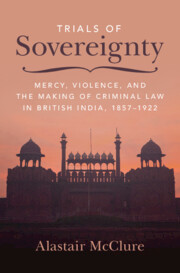Book contents
- Trials of Sovereignty
- Studies in Legal History
- Trials of Sovereignty
- Copyright page
- Dedication
- Contents
- Figures and Table
- Acknowledgments
- Abbreviations
- Introduction
- 1 Forgetting War and Punishing Crime
- 2 The Peace: The Queen’s Proclamation and the Politics of Forgiveness
- 3 The Code: Judges, Juries, and Punishing Difference
- 4 Discretion, the Death Penalty, and the Criminal Trial
- 5 Pardons and Scaffolds
- 6 Tilak’s Radical Innocence: Mercy, Sedition, and the State Trial
- 7 Gandhi’s Guilt and the Return of War
- Conclusion
- Epilogue
- Select Bibliography
- Index
- Studies in Legal History
Conclusion
Published online by Cambridge University Press: 20 November 2024
- Trials of Sovereignty
- Studies in Legal History
- Trials of Sovereignty
- Copyright page
- Dedication
- Contents
- Figures and Table
- Acknowledgments
- Abbreviations
- Introduction
- 1 Forgetting War and Punishing Crime
- 2 The Peace: The Queen’s Proclamation and the Politics of Forgiveness
- 3 The Code: Judges, Juries, and Punishing Difference
- 4 Discretion, the Death Penalty, and the Criminal Trial
- 5 Pardons and Scaffolds
- 6 Tilak’s Radical Innocence: Mercy, Sedition, and the State Trial
- 7 Gandhi’s Guilt and the Return of War
- Conclusion
- Epilogue
- Select Bibliography
- Index
- Studies in Legal History
Summary
During the writing of this book, the history of imperial mercy has periodically emerged as a site of national debate in India. The issue has revolved almost singularly around Vinayak Damodar Savarkar, the ideologue of Hindutva and vocal critic of the Indian National Congress. The historical context around this ongoing controversy requires a short summary.
In 1910, Savarkar was placed on trial in the Bombay High Court for waging war against the king and abetment to murder. The charges were a response to the assassination of Arthur Jackson, the collector of Nasik in western India. As explored briefly in Chapter 5, Jackson had been shot dead by the young revolutionary Anant Kanhere. Before Kanhere was executed, he implicated Savarkar in the plot. Savarkar was subsequently found guilty on both counts and sentenced to transportation for fifty years.
- Type
- Chapter
- Information
- Trials of SovereigntyMercy, Violence, and the Making of Criminal Law in British India, 1857–1922, pp. 319 - 327Publisher: Cambridge University PressPrint publication year: 2024

